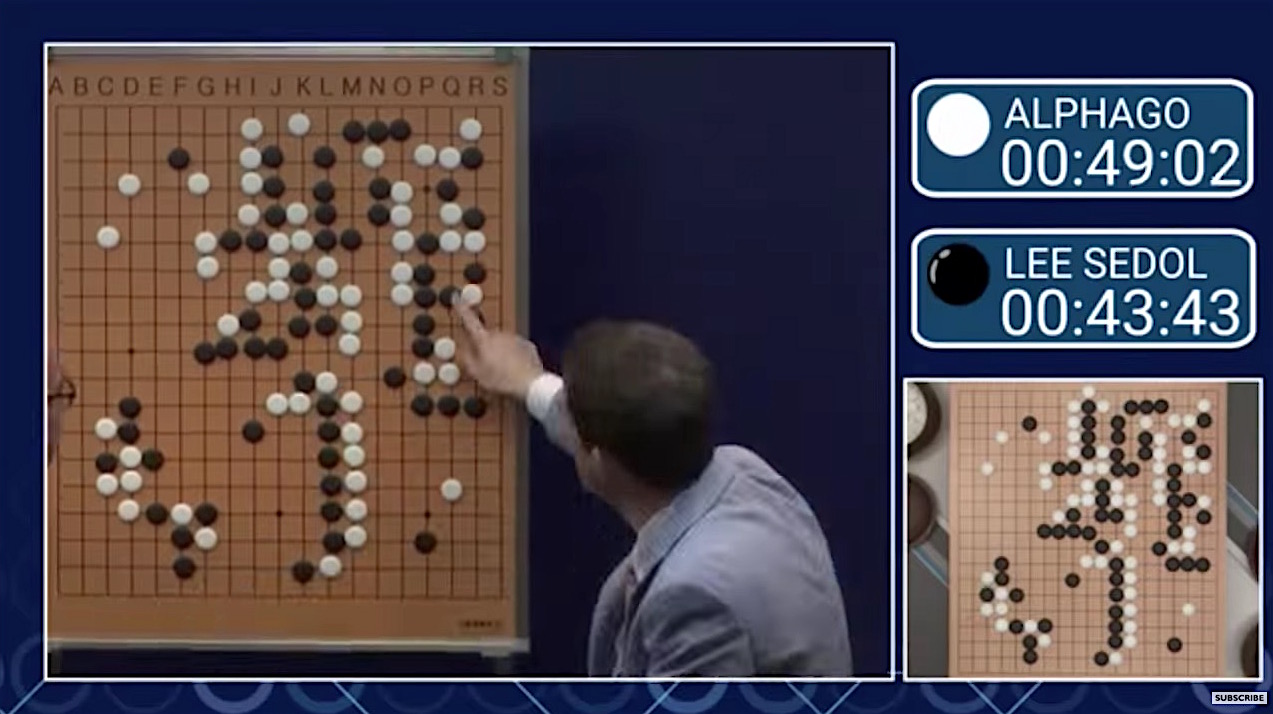Google AI machine beats Go master in world's hardest board game


A free daily email with the biggest news stories of the day – and the best features from TheWeek.com
You are now subscribed
Your newsletter sign-up was successful
On Wednesday, Google DeepMind's AlphaGo notched a new milestone in artificial intelligence, beating a champion player in one of the world's oldest and probably most complex board game, Go. The Go master, Lee Se-dol of South Korea, had initially predicted he would beat AlphaGo in at least four of the five scheduled games, arguing that the 3,000-year-old Chinese game requires "human intuition." Some AI experts had agreed.
"I am very surprised because I have never thought I would lose," Lee said after falling to the AI software in Game 1. "I didn't know that AlphaGo would play such a perfect Go." He still put his odds of prevailing in the best-of-five series at 50-50. He'll have his next shot on Tuesday, for Game 2. The victory of Google's DeepMind over the human mind is being compared to IBM Big Blue's defeat of chess grand master Gary Kasparov in 1997. Demis Hassabis, the founder and head of DeepMind, called the win a "historic moment," adding, "Really, the only game left after chess is Go."
Go is a two-player strategy game where you use black or white stones to try and win territory on a board. Instead of considering the seemingly infinite options, AlphaGo had already taught itself to improve and pick the best moves by playing millions of games against itself and the numerous Go games you can play online.
The Week
Escape your echo chamber. Get the facts behind the news, plus analysis from multiple perspectives.

Sign up for The Week's Free Newsletters
From our morning news briefing to a weekly Good News Newsletter, get the best of The Week delivered directly to your inbox.
From our morning news briefing to a weekly Good News Newsletter, get the best of The Week delivered directly to your inbox.
Matches between man and machine are almost always lopsided in one direction. "But every once in awhile, a technological moment comes when the man-machine match-up gives us a fight worth watching," says Erik German at Quartz. "(Just ask John Henry.) DeepMind vs. Lee Se-dol is one of those moments." Game 1 took three and a half hours to play, but BBC News sped that up to a brisk 25 seconds. You can watch below. Peter Weber
A free daily email with the biggest news stories of the day – and the best features from TheWeek.com
Peter has worked as a news and culture writer and editor at The Week since the site's launch in 2008. He covers politics, world affairs, religion and cultural currents. His journalism career began as a copy editor at a financial newswire and has included editorial positions at The New York Times Magazine, Facts on File, and Oregon State University.
-
 Health insurance: Premiums soar as ACA subsidies end
Health insurance: Premiums soar as ACA subsidies endFeature 1.4 million people have dropped coverage
-
 Anthropic: AI triggers the ‘SaaSpocalypse’
Anthropic: AI triggers the ‘SaaSpocalypse’Feature A grim reaper for software services?
-
 NIH director Bhattacharya tapped as acting CDC head
NIH director Bhattacharya tapped as acting CDC headSpeed Read Jay Bhattacharya, a critic of the CDC’s Covid-19 response, will now lead the Centers for Disease Control and Prevention
-
 ‘One Battle After Another’ wins Critics Choice honors
‘One Battle After Another’ wins Critics Choice honorsSpeed Read Paul Thomas Anderson’s latest film, which stars Leonardo DiCaprio, won best picture at the 31st Critics Choice Awards
-
 Son arrested over killing of Rob and Michele Reiner
Son arrested over killing of Rob and Michele ReinerSpeed Read Nick, the 32-year-old son of Hollywood director Rob Reiner, has been booked for the murder of his parents
-
 Rob Reiner, wife dead in ‘apparent homicide’
Rob Reiner, wife dead in ‘apparent homicide’speed read The Reiners, found in their Los Angeles home, ‘had injuries consistent with being stabbed’
-
 Hungary’s Krasznahorkai wins Nobel for literature
Hungary’s Krasznahorkai wins Nobel for literatureSpeed Read László Krasznahorkai is the author of acclaimed novels like ‘The Melancholy of Resistance’ and ‘Satantango’
-
 Primatologist Jane Goodall dies at 91
Primatologist Jane Goodall dies at 91Speed Read She rose to fame following her groundbreaking field research with chimpanzees
-
 Florida erases rainbow crosswalk at Pulse nightclub
Florida erases rainbow crosswalk at Pulse nightclubSpeed Read The colorful crosswalk was outside the former LGBTQ nightclub where 49 people were killed in a 2016 shooting
-
 Trump says Smithsonian too focused on slavery's ills
Trump says Smithsonian too focused on slavery's illsSpeed Read The president would prefer the museum to highlight 'success,' 'brightness' and 'the future'
-
 Trump to host Kennedy Honors for Kiss, Stallone
Trump to host Kennedy Honors for Kiss, StalloneSpeed Read Actor Sylvester Stallone and the glam-rock band Kiss were among those named as this year's inductees
